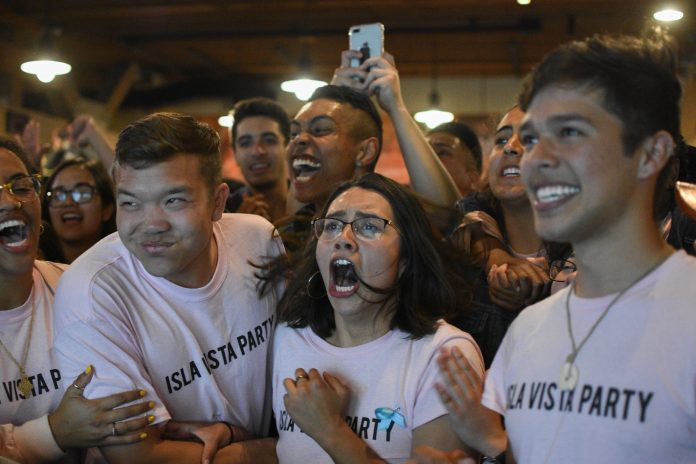
Lauren Marnel Shores and Jeremy Levine
Campus Beat Reporter and Deputy Editor
Capping off an election season that revolved around social media and memes to an unprecedented degree, the Isla Vista Party won more Associated Students political positions than it ever has in the party’s three-year history, taking three executive spots and ten seats in senate.
Furthermore, the controversial “NewCen” fee initiative, which promised to renovate the university center using student fees, failed. Students turned out to vote at the highest rate since 2014, with 81.6 percent of students voting to block the renovation plan.
This year’s election results cement IVP’s status as a competitive party, representing a shift in the political landscape on campus. Last year, IVP took none of the executive spots and 9 out of 25 senate seats; CU walked away with all four of the partisan executive positions and the remaining Senate seats.
Now, CU holds the presidency and 14 senate spots. Brooke Kopel of Campus United won the presidency with 3,502 votes, a 140 vote margin over IVP’s presidential candidate, Justice Dumlao.
Needing one vote over 50 percent to pass, the “NewCen” initiative failed 1,393 votes to 6,214. Upon the announcement of the failure of the “NewCen” ballot fee, a number of students in attendance at the election results night chanted “No NewCen!”
The remaining partisan executive position-elects, all running with the Isla Vista Party, are Steven Ho as Internal Vice President, Jeike Meijer as External Vice President for Local Affairs, and Mayela Morales as External Vice President for Statewide Affairs.
The final executive office, the Student Advocate General, was secured by Grecia Martinez. Martinez won the historically nonpartisan office with 3,588 votes. Her margin of victory, 1,111 votes over fellow independent candidate Rose Ettleson in the race for next year’s SAG, was the largest of the year among the executive positions.
“I know A.S. is really toxic but I really hope I can make it a different space where all people feel welcomed and encouraged to come into the student general advocate’s office,” Martinez said in an interview after her victory.
Other ballot items performed favorably in the election. Despite an amendment that passed last year raising the percentage of votes needed to reaffirm lock-in-fees from 50 percent support to 60 percent, each of this year’s fees overcame the required threshold. All but two organizations, A.S. Finance Board and the United States Student Association, received more than 70 percent approval.
Students’ association between the “NewCen” and CU likely contributed to CU’s decline from its previously held dominant position. Although CU did not endorse the “NewCen,” and many CU candidates vocally argued against the “NewCen,” students interviewed by TBL in the run-up to the election frequently connected their support for IVP to a dislike of CU because they believed the party supported the renovation initiative.
The Facebook group UCSB Zesty Meme Cuisine for Horny Teens and other UCSB social media pages partially contributed to the shift in politics as well, some believe. Zion Solomon, an incoming on-campus senator who ran with IVP, said “[the memes] reflect student outrage with the raising of student fees.”
However, many members from both parties denounced both publicly and in interviews certain memes posted; A.S. Senate passed a resolution on April 4 titled “A Resolution Against Cyber Bullying” that was largely in response to memes deemed overly offensive.
On the afternoon of election day, A.S. Executive Director Marisela Marquez addressed student concerns in an email: “I have become aware of a lot of vicious art (also known as memes) spread through social media. These narratives may be thought to be humorous and innocuous —but they can be seen as extremely damaging against the values of this department, our campus and university system.”
Marquez encouraged students to report “hate filled images, words, narratives [sic]” seen online through EthicsPoint, a third party provider hired by the UC system to “provide a confidential means of reporting misconduct,” according to the program’s website. The email does not specify how administration would respond to reported misconduct.
Despite what Marquez and others have described as toxicity leading up to this election, student leaders praised the current Senate for rising above the drama.
“The current Senate right now has done a really good job of being very nonpartisan on a lot of issues and I really appreciated that,” said Ho, the incoming IVP. “But with the next Senate I just really hope that it just takes off on the right foot.”
Nkechi Ikem, Victoria Penate, and Arturo Samaniego contributed reporting for this article.











Steven talks about “nonpartisanship” but is literally the epitamy of a one-sided, biased person. I feel bad for every single senator who got elected and is forced to listen to his ANNOYING voice and biased remarks/ actions all year long. waste of a candidate
Comments are closed.